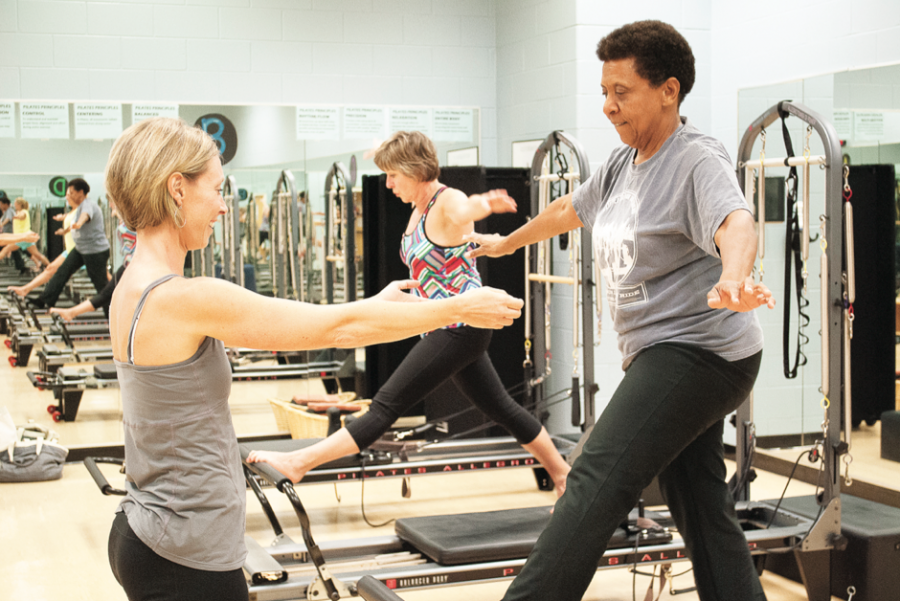In addition to free group exercise classes, the University Recreation Center also offers a variety of paid classes that provide students with access to different machines and more individual attention from trainers. One of these classes is Pilates Reformer.
Unlike traditional mat Pilates, Pilates Reformer uses a machine to add resistance. Reformer instructor Jamie Lambert, who also teaches mat Pilates and water aerobics, compares the workout to a combination of mat Pilates and weight training. The spring-loaded Reformer machine offers resistance that provides a full-body workout that differs from the bodily-generated resistance used in mat Pilates.
“You get more strength training versus the mat Pilates online. Unless you incorporate straps or bands or rings [in mat Pilates] your body is doing its own work. [In Reformer] we can isolate a certain muscle while still letting the whole body work,” Lambert said.
Lambert teaches classes to a variety of age groups and says the workout is something people of most ability levels can do. She also said the Reformer class has the therapeutic benefit of preventing future injury and relieving existing pain.
“I enjoy teaching [Reformer] to college students because I know I’m giving them an exercise that’s only going to benefit them in the future,” Lambert said. “With my community population they might have aches and pains coming in and I may get a phone call that says ‘I haven’t had to take an ibuprofen in over a week.’”
Though the Pilates Reformer class is not free, the rate for the class at the Rec is still lower than it would be in a typical gym. Instead of charging $20 to $40 per class for individuals, the typical rate for a Reformer class, the cost is $15 per class for students and $20 for non-students. The Rec also offers a group rate of $45 per class for groups of three to six people. The cost is divided amongst the group so the cost could be as low as $7.50 per class.
Students can get a taste of the Reformer class with the free introductory class provided by the Rec. Commitment to the class is on a month to month basis, so participants can opt out of the class if they are not satisfied.
Paid classes like Reformer tend to be smaller than free classes, giving participants more individual attention from the trainer and the trainer the ability to cater to individual needs.
“[In a large class] I can’t walk around and stare at all 30 people. In here each machine has its own springs so I can put one [person] on heavier springs while another might be on lighter springs,” Lambert said. “You’re able to get an exercise completely specific to your body.”
Sarah Lecher, a junior majoring in communication studies, has been taking Pilates Reformer for almost two years. She began taking mat Pilates classes with Lambert and after a free introductory Reformer class became hooked on the workout.
“I really love Pilates in general but [Reformer is] a lot different because you’re using springs for resistance versus your own body. You can do certain exercises, like going overhead, that you wouldn’t be able to do with your own body,” Lecher said. “[Reformer] is a lot more addictive [than mat] Pilates and you see results faster.”
Despite the benefits of the paid classes, the cost and commitment keeps some students from participating. Hannah Vander Maas, a junior majoring in history and economics, regularly attends the free mat Pilates class offered by the Rec. She said the free classes suit her needs enough not to need paid classes.
“I wouldn’t [take a paid class] because the free classes are at a convenient time and they’re never full,” Vander Maas said.
For more information on Pilates Reformer and a schedule of class times, visit urec.ua.edu and look under the Fitness tab.









